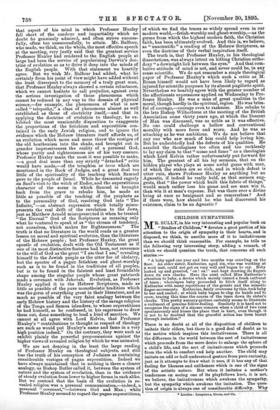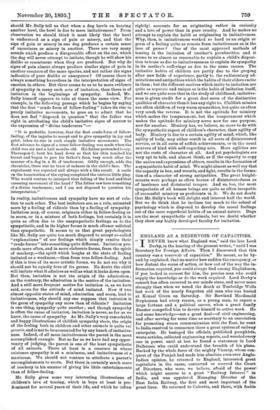CHILDISH SYMPATHIES.
MR. SULLY, in his very interesting and popular book on "Studies of Children,"* devotes a good portion of his attention to the origin of sympathy in their hearts, and is disposed, we think, to ascribe more of it to imitativeness than we should think reasonable. For example, he tells us the following very interesting story, adding a remark, of which we should question the truth, that concerns all such stories :— "A baby aged one year and two months was crawling on the floor. An elder sister, Katherine, aged six, who was working at a wool mat, could not get on very well and began to cry. Baby looked up and grunted, ' on ! on !' and kept drawing its fingers down its own cheeks. Here the aunt called Miss Katherine's attention to baby, a device which merely caused a fresh outburst of tears ; whereupon baby proceeded to hitch itself along to Katherine with many repetitions of the grunts and the mimetic finger-movements. Katherine, fairly overcome by this, took baby to her and smiled ; at which baby began to clap its hands and to crow, tracing this time the course of the tears down its sister's cheeks. This pretty nursery-picture certainly seems to illustrate a rudiment of genuine fellow-feeling. Similarly it is hard not to recognise the signs of a sincere concern when a child of two runs spontaneously and kisses the place that is hurt, even though it is not to be doubted that the graceful action has been learnt through imitation."
There is no doubt at all of the disposition of children to imitate their elders, but there is a good deal of doubt as to the motive which inspires this imitativeness. There is all the difference in the world between the sort of imitativeness which proceeds from the mere desire to enlarge the sphere of a child's life, and the sort of imitativeness which proceeds from the wish to comfort and help another. The child may imitate an odd or half-understood gesture from pure curiosity, just as it attempts to draw what it sees, if it has any of that feeling for likeness and unlikeness which is one of the signs of the artistic nature. But when it imitates a mother's tenderness on seeing one of its playfellows hurt, it is not, we believe, the imitativeness which awakens the sympathy, but the sympathy which awakens the imitation. The ques- tion of origin is always one of considerable difficulty. Why
• London : Longmana, Green, and Co.
should Mr. Sully tell us that when a dog howls on hearing another howl, the howl is due to mere imitativeness ? From observation we should think it most likely that the howl is understood as a sign of pain or misery, and that the sign of pain or misery in one dog produces a certain sense of uneasiness or misery in another. There are very many sounds which produce a disagreeable effect on the ear, which the dog will never attempt to imitate, though he will show his dislike or resentment when they are produced. But why do signs of pain almost always produce similar signs of pain in another creature of the same species, and not rather the signs indicative of pure dislike or annoyance ? Of course there is always something hazardous in the interpretation of signs of emotion in others. But there seems to us to be more evidence of sympathy in many such acts of imitation, than there is of imitation in the beginnings of sympathy. Indeed, Mr. Sully himself appears to take at times the same view. For example, in the following passage which he begins by saying that the first "crude form of fellow-feeling" takes its rise in purely imitative movements, he goes on to admit that he does not feel "disposed to question" that the father was right in attributing the child's imitative signs of sorrow to the expression of "divine tenderness ":—
"It is probable, however, that the first crude form of fellow- feeling, of the impulse to accept and to give sympathy in joy and grief, takes its rise in such simple imitative movements. The first advance to signs of a truer fellow-feeling was made when the child was six and a half months old. His father pretended to cry. Thereupon C. bent his head down so that his chin touched his breast and began to paw his father's face, very much after the manner of a dog in a fit of tenderness. Oddly enough, adds the chronicler, there was no trace of sadness in the child's face. The experiment was repeated and always with a like result. A smile on the termination of the crying completed the curious little play. Who would venture to interpret that falling of the head and that caressing movement of the hand ? The father saw here something of a divine tenderness; and I am not disposed to question his interpretation."
In reality, imitativeness and sympathy have no sort of rela- tion to each other. The best imitators are, as a rule, animated more by a feeling of ridicule than by a feeling of sympathy. Imitation may, of course, originate either in fellow-feeling or in scorn, or in a mixture of both feelings, but certainly it is quite as often due to the unsympathetic feelings as to the sympathetic, and in its higher forms is much oftener satirical than sympathetic. It seems to us that great psychologists like Mr. Sully are quite too much disposed to accept so-called "explanations" of our feelings which simply resolve their "crude forms" into something quite different. Imitation pro- ceeds more often, and in more elaborate forms, from the spirit of mockery,—the spirit which laughs at the state of feeling imitated as a weakness,—than from true fellow-feeling. And if this is true of its more artistic forms, we do not see why it should not be equally true of its germs. No doubt the child will imitate what it admires as well as what it looks down upon. But then, imitation is not the origin of the admiration ; on the contrary, the admiration is the motive of the imitation. And a still more frequent motive for imitation is, as we have said, scorn for the attitude of mind imitated. Now if two almost opposite states of mind, admiration and scorn, lead to imitativeness, why should any one suppose that imitation is the germ of sympathy any more than of ridicule? Imitation is one thing, sympathy quite another ; and though sympathy is often the cause of imitation, imitation is never, so far as we know, the cause of sympathy. As Mr. Sully's very remarkable and happy illustrations of childish sympathy show, the origin of the feeling both in children and other animals is quite sui generis, and is not to be accounted for by any knack of imitative- ness. Indeed, of all mere imitativeness the parrot is the most accomplished example. But so far as we have had any oppor- tunity of judging, the parrot is one of the least sympathetic of all animals. There at least is a creature in whose existence sympathy is at a minimum, and imitativeness at a maximum. We should not venture to attribute a parrot's accomplishments to scorn. But there is certainly much more of mockery in his manner of giving his little entertainments than of fellow-feeling.
Mr. Sully gives some very interesting illustrations of children's love of teasing, which in boys at least is pre- dominant for several years of their life, and which he (often rightly) accounts for as originating rather in curiosity and a love of power than in pure cruelty. And he makes no attempt to explain the habit as originating in imitativeness. Why, then, is imitativeness worked so hard as an origin or germ of a feeling quite as remote from imitativeness as is the love of power ? One of the most approved methods of teasing is the imitation of another's peculiarities, and it seems to us almost as reasonable to explain a child's disposi- tion to tease as due to imitativeness as to explain its sympathy in its mother's sufferings as due to the same causes. The imitative habits of children are partly due to the groping after new fields of experience, partly to the rudimentary ad- mirations and antipathies which the habits of their elders excite in them ; but the different motives which incite to imitation are quite as separate and unique as is the habit of imitation itself, and we are quite sure that in the study of childhood, imitative- ness is given credit for a great deal more of the distinctive qualities of character than it has any right to. Childish mimics are often children of very warm sympathies, but quite as often very much the reverse. It is not the aptitude for mimicry which makes the temperament, but the temperament whiah makes the aptitude for mimicry serve now for one purpose, now for another. Mimicry has, we believe, no more to do with the sympathetic aspect of children's character, than agility of body. Mimicry is due to a certain agility of mind, which, like agility of body, may either result in all sorts of disinterested service, or in all sorts of selfish achievements, or in the usual mixture of kind with self-regarding acts. Mere agilities are not the roots of character at all. And yet psychologists are very apt to talk, and almost think, as if the capacity to copy the antics and expressions of others, results in the formation of a sympathetic habit of mind. We might almost as well say that the capacity to box, and wrestle, and fight, results in the forma- tion of a character of strong antipathies. The great knight- errants were perhaps as often heroes of disinterestedness as of insolence and dictatorial temper. And so, too, the most sympathetic of all human beings are quite as often incapable of successful mimicry as proficients in it. We do not doubt that Mr. Sally's book will delight and interest half the world. But we do think that he inclines too much to the school of psychology which is disposed to develop the moral feelings out of the mere superficial habits of an animal nature. Dogs are the most sympathetic of animals, but we doubt whether they show any highly developed faculty for imitation.











































 Previous page
Previous page